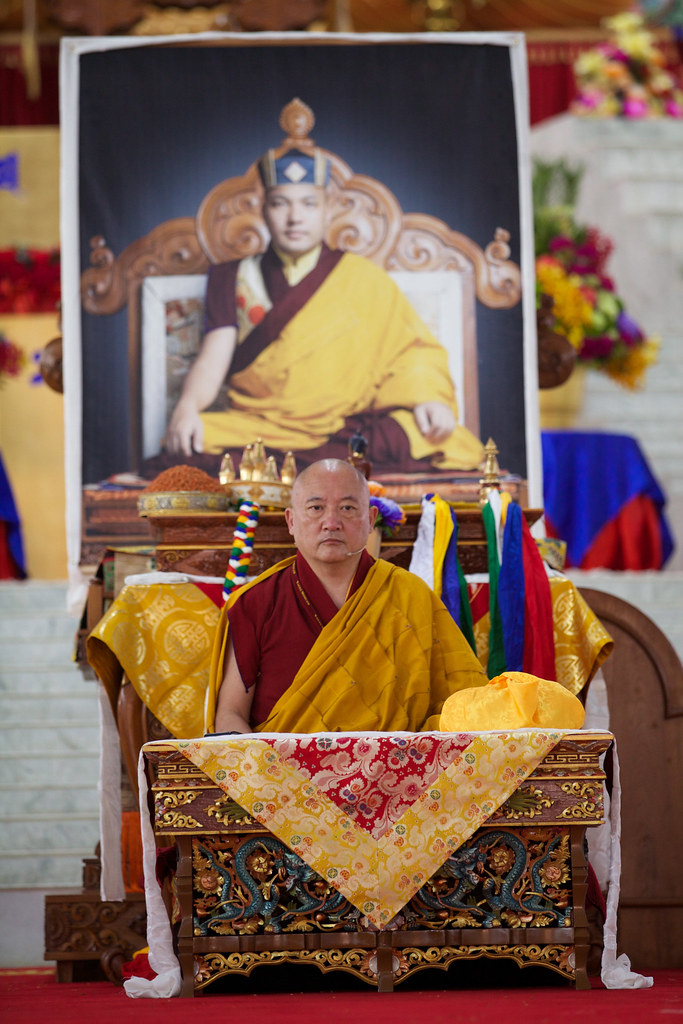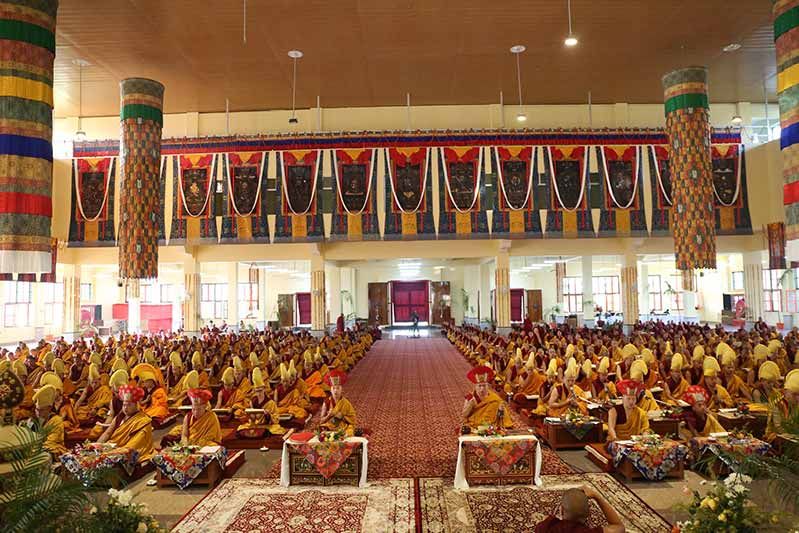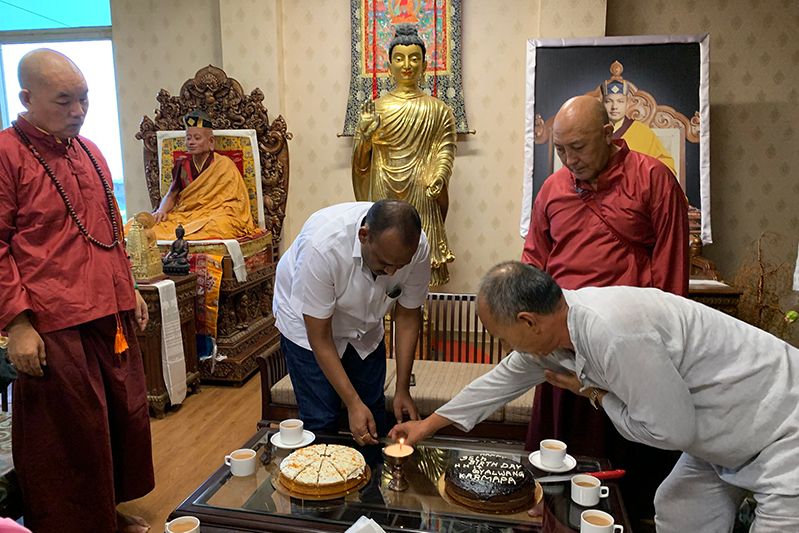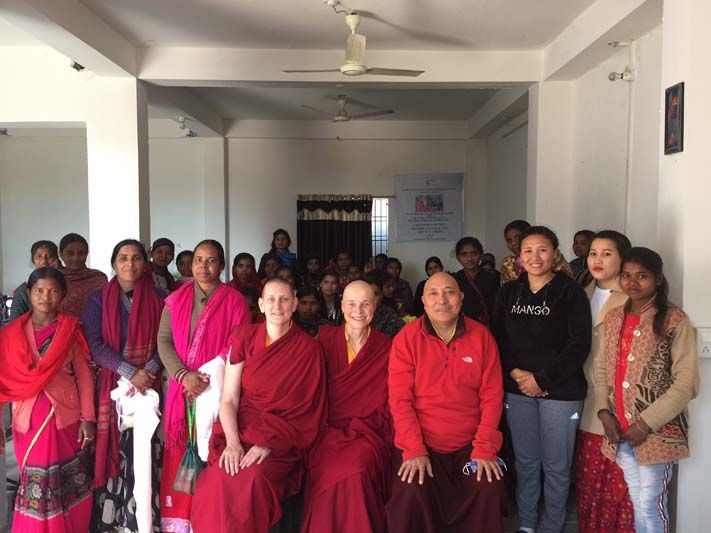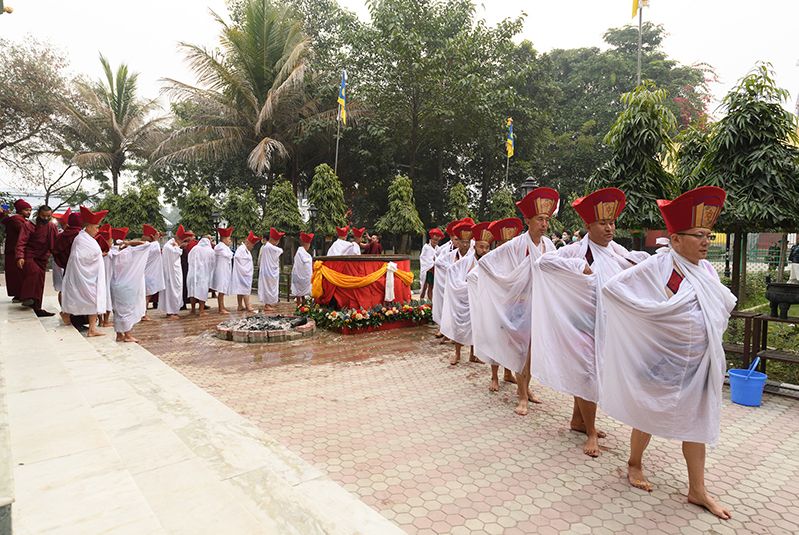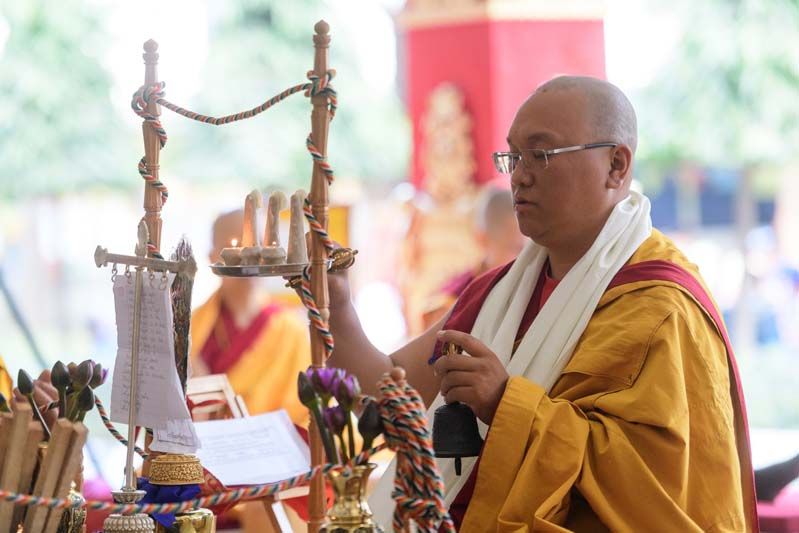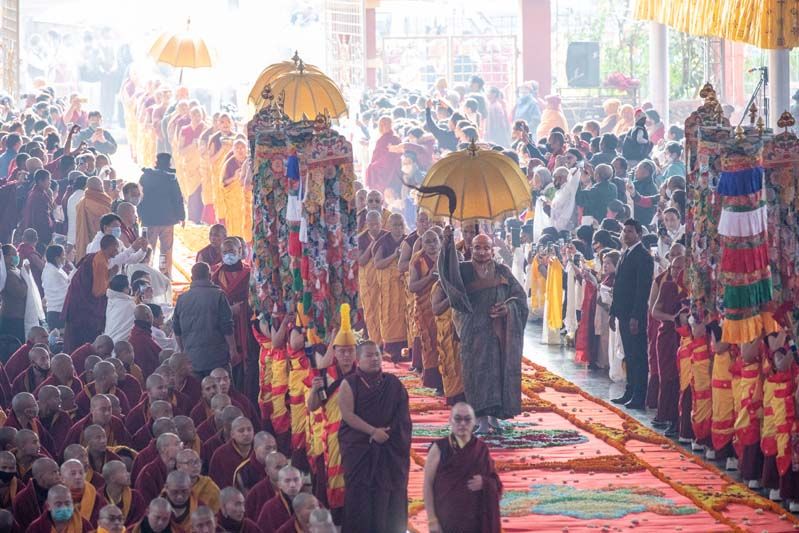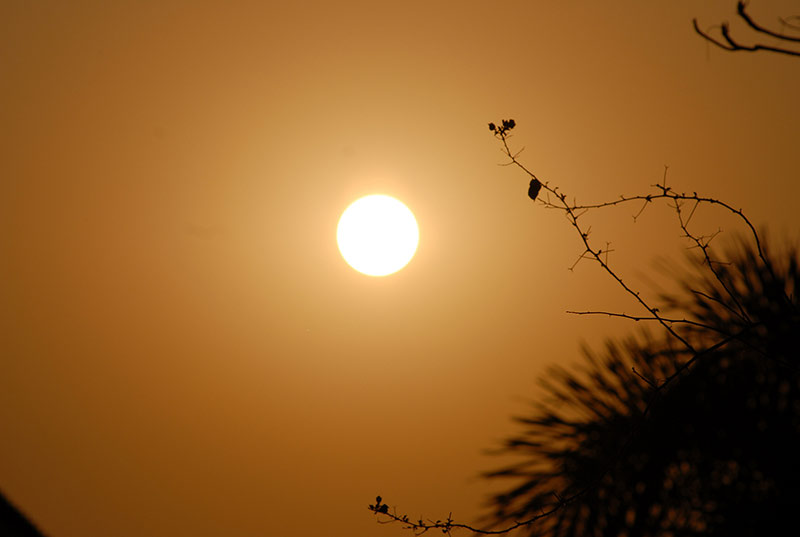
Having greeted the Rinpoches, monastics, and lay students, His Holiness continued teaching on the Long Soliloquy from the section which emphasized the temporariness of this present life, feeling revulsion towards samsara, and the compulsion to practice the Dharma immediately.
Compared to Future Lives, the Present Life is Temporary
One of the crucial points of the first passage His Holiness read is to avoid imprudent advice that misguides the Dharma practitioner. Geshe Potowa says,
Now is the time to look for a good guru, but some say, ‘What good will going to see a guru do? It would be better to fake meditating.’ Many people talk like that. You need to gather incalculable accumulations to meet a good guru, so what good will it do to not look now and instead keep faking it? If you meet a good guru, you will develop samadhi through the guru’s blessings. Because of that, you will realize your mind and awaken to buddhahood. But some would rather not be criticized than awaken to buddhahood.
Geshe Potowa encourages us : not to see who is the most ambitious, who the most assertive, and who is the biggest swindler but to see how to direct the mind towards the Dharma. Furthermore, there are some who only say the spiritual master is compassionate if he gives something material and criticize anyone looking for a guru and pith instructions.
His Holiness explicated the meaning of this passage underscoring that some say they are willing to help care for things in this life, but there are very few who will support or provide for your future lives. He said, “Actually, compared to future lives, the present life in terms of time is just temporary. When we talk about the life after this, and the life after that, there is no end.” Understanding this is extremely important, but also rare.
I’m Definitely Going to Die
Continuing with the text, the following verses remind us that knowing we will have to leave everything behind is not a far-fetched tale: Yet, those who are clever, assertive, and ambitious do not sense this.
His Holiness summarized that we cannot take life’s pleasures along with us when we die. As he said:
If you know how to be content, even if you are a disabled beggar whose hands and feet have been amputated living in the rough by the side of the road, you can still bear life; you can still handle it. Basically, no matter how much power and wealth you have, in the end of it all, it will be like drawing a hair out of butter. You will have to go on alone; there is no way to take along any of your wealth, possessions, or power.
His Holiness gave the example of someone with a serious illness trying to avoid death. Even they do not have the intense feeling, “I will die; I’m definitely going to die.” Even more, we work hard right now so as not to have many challenges when we are old. When we are old, we physically deteriorate and are unhappy until we die. But then, our future lives will be exactly the same. “For this reason,” His Holiness emphasized, “if we spend our entire lives only working towards our ambitions for this life, working for the sake of this life from the time we are young on, we will not be happy in our next life.”
Our Mind Should Be Comfortable at the Time of Death
Geshe Potowa’s verses elaborate upon the thoughts of this life such as, “Today I’ll do this. Tomorrow, I’ll do that. Next year, I’ll do this. I’ll do that when I’m old.” But, he says, “Practitioners should do the opposite and not include immortality in their discussions. Then you can make preparations for death.” He reiterates these points because at the time we leave this life behind, we should be comfortable at the time of death.
His Holiness commented that some think there is no point in saying, “I’m going to die.” It just scares you.” But, as Dharma practitioners, we should prepare for our death by doing the things that will help us as we are dying. He further emphasized that, “We should be saying, ‘I’m going to die. I don’t know when I’ll die. I don’t know what will be the cause of my death.’” Thinking this way will help prepare us to have confidence and comfort in mind when we die. Otherwise, “If that does not occur,” he said, “you may have spent your entire life practicing dharma, but if we do not feel comfortable and satisfied when we get to the time of death, it will not have been much benefit.”
A Monastic is Someone Who is Revolted by Samsara
Turning back to the text, His Holiness read,
Merely not getting married does not help. You must turn your back on the eight worldly concerns. Gathering merit means that your mind becomes the Dharma, not that you are well-respected or have good clothes. You might be sick with leprosy, blind with your hands and feet amputated, your clothes so badly tattered no one could take hold of them, but if your mind becomes Dharma, that is called accumulating merit.
His Holiness commented that the first line of this passage is a reminder that, “a monastic is someone who should be revolted by samsara and who has the intention to be emancipated from samsara.” He explained that in Karma Chakme’s Mountain Dharma, it says that Tibetans only have one vow – if a monk does not meet his wife, then his vows are pure. However, His Holiness asserted that, “You can’t say that just not getting married makes you a monastic” for this is not what is actually said in the Vinaya. “For the monastics,” he said, “there are the four root precepts or four defeats: killing, taking that which is not given, sexual activity, and lying about supreme human qualities.” He encouragingly said, “If you know the Vinaya well, keeping the vows well is not all that difficult.” This is because the Buddha has great compassion and does not force anyone. So, if a monastic encounters real difficulty where the vows cannot be kept, it is possible to give back the vows by telling a qualified person. If this is done and one wishes to take the precepts again in the future, you may. Whereas, if someone has difficulties and loses the vows, in the future, they cannot be truly received even if the motivation exists to take them again.
Set Out on the Path and Go
His Holiness stressed that the next passage centers on, “No matter what practice you are doing, it is to be done today.” As the Long Soliloquy says,
To say you understand the Dharma is to say that you know the methods to achieve Buddhahood. The words are not the point. Instead of saying you have knowledge of the path, it is better to set out on the path and go. If you do not start practicing right now, you may think that you will meditate after you have made all your preparations, but that time will never come. You will use up your whole life preparing.
His Holiness clarified that there is a distinction between knowing and understanding the Dharma:
The reason they are different is that if you really know the Vinaya and understand it as it should be understood, you will be able to practice it. In order to understand it, you need to know it – you can’t understand something you don’t know. But there are many things we know but don’t understand…. it’s better to actually set out on the path and go.
He also reminded us that we tell ourselves that we are going to practice, but then stall because we need to make preparations. But, then it is possible to spend your whole life getting ready. He poignantly said, “You need to develop understanding of it within your being. When you develop that understanding of the meaning in your being, then you will be able to put it into practice.”
Abandoning the Afflictions
Returning to the text, His Holiness read: Some say that tantra and the Vinaya are exclusive of each other, but they have misunderstood. His Holiness explained that, “This is a question of not really understanding it.” Because as Geshe Potowa says: If something occurs that is an inappropriate basis for the mantra, it is not the Vinaya. If something occurs that violates the Vinaya, it is a sign of it not being the secret mantra.
The analogy used is planting a field. Sometime it needs to be irrigated, sometimes it needs to be ploughed with oxen. By piling on all these efforts there will be good crops. “Likewise,” His Holiness said, “whatever practice we do, whether tantra or vinaya, it all needs to be piled on top of the afflictions…there is no practice for which we don’t need to put this life out of mind. There is not practice that doesn’t involve abandoning the afflictions.”
Geshe Potowa poses two questions: What good is a teacher learned in Dharma that is not an antidote for the five poisons? What can cure an illness that cannot be remedied by medicine? In response, His Holiness explained that, “Sometimes there are geshes and khenpos who know a lot of Dharma and like to talk...but, their motivation has been crooked from the beginning.” Or, maybe becoming famous is their aim. His Holiness said that, “For such individuals, such geshes and khenpos, there’s no liberation from samsara.”
Turning to the second question, “No matter what Dharma we practice,” His Holiness continued, “it must act as an antidote for suffering. If you don’t make it an antidote for the suffering, being learned about the dharma and being able to explain it to people does not help. Actually, Dharma is medicine for curing the illness of the afflictions.” If we are resistant to the the medicine of Dharma, “your mind stream will turn so wild that no one can handle it.” But, if the medicine of Dharma does not help your mind stream, what good is fame and renown? If you are to be reborn in the lower realms, fame does not follow you and neither does pretending to be venerable do you any favors. While you may fool some, “the Lord of Death has a mirror, and whatever the situation, whether it is true or false will appear in it.” Most importantly, a true spiritual friend helps others turn away from committing and accumulating misdeeds. What is extremely rare are those meditators, good lamas, khenpos or geshes who “do whatever they can to help the students around them avoid misdeeds or sufferings and bring them to virtue.”
Finishing up reading the text for the day, His Holiness read the verses of Geshe Potowa,
Making this life most important and practicing the Dharma on the side will not work, but no one will listen. If you do not recall death, you will do whatever is most profitable in this life. You will even be able to violate your guru’s commands if they do not measure up to your ambitions. If it seems it will profit you in this life, you will pretend to be so faithful and so devoted to the guru. Deep down, this annoys me.
Summarizing briefly, His Holiness said the meaning of this passage is that when you make distinctions in your mind between your own and others, then, it is certain you have not developed bodhichitta. Further, committing misdeeds to protect your own is a wrong path for anyone.
A Connection Between Us
As he concluded the day’s teachings, His Holiness relayed his own experience with giving the teachings this year. For him personally since he is only looking at the cameraman, it is different than previous years when he is actually at the Monlam. He said, “The feeling is different. But as much as I can, I am imagining that you are all there...In that way, I feel there is some sort of connection between us.” He continued, “When I teach this, even if we can’t all put this into practice right now, when I teach and you listen, it moves us somehow. In particular, it helps us see a lot of our faults.” As he said, one extremely important thing is to gain a degree of understanding, incorporate it into our mind streams again and again as we make efforts to change ourselves. And, if we can do this, there will be the great benefit of the Dharma.
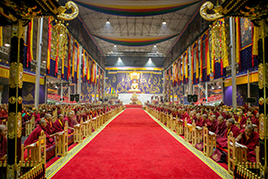
37th Kagyu Monlam Schedule
Tibetan / English / Chinese • French • German • Indonesian • Korean • Polish • Russian • Spanish • Vietnamese
Dharma Teachings
 Meditation Instructions
Meditation Instructions
Recorded during the 37th Kagyu Monlam, Bodhgaya, India. January 28-30, 2020.
